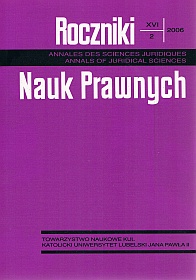Prescription in the Principles of European Contract Law Seen from Polish Perspective
Abstract
The aim of the article is to present the prescription model in Principles of European Contract Law and to demonstrate its advantages and drawbacks in the light of the Polish Civil Code. First, the origin and the significance of the principles are characterized, and then the main purpose of regulation – the unification of the model. This is done by subjecting all types of claims to identical prescription principles as well as by abbreviating and standardizing prescription periods.
In the latter part of the article the author discusses individual elements of the prescription system, namely claims subject to prescription, periods of prescription, and the moment at which the prescription period starts running. Next, it is assumed that the European model of prescription is of subjective character. If the subject is ignorant of his entitlement to such a claim, this fact leads to the suspension of the course of the prescription period. A subjective model better suits current needs, making it possible to shorten the periods of prescription, and provides better protection of interests of the entitled person. Finally, circumstances interfering with the course of prescription period are presented. Additionally, a conventional regulation of prescription and the effects of prescription period termination are presented.
Copyright (c) 2006 Roczniki Nauk Prawnych

This work is licensed under a Creative Commons Attribution-NonCommercial-NoDerivatives 4.0 International License.


